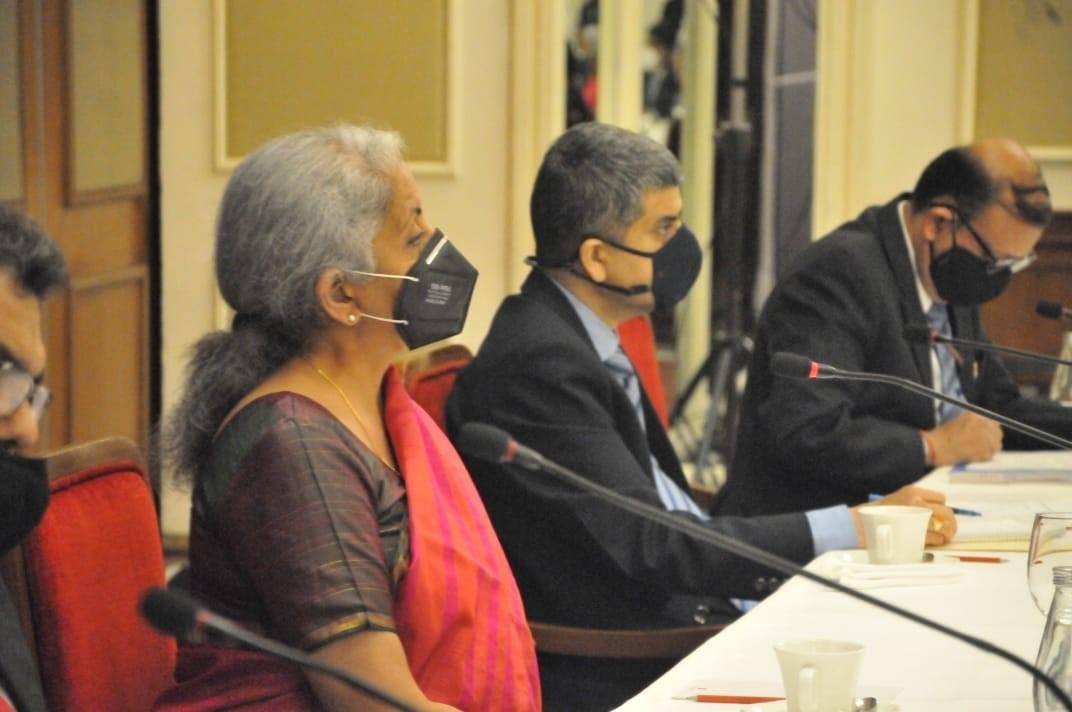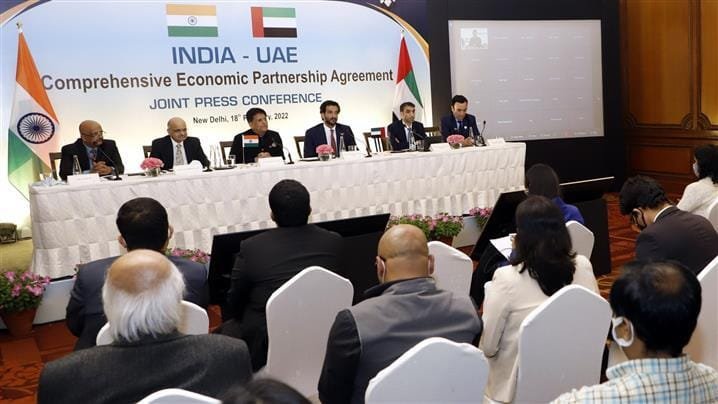BASIC speaks in one voice

Brazil, South Africa, India and China (BASIC) play an important role in making Paris agreement accepted in letter and spirit by the World, Minister for Environment, Forest and Climate Change, Prakash Javadekar, said Sao Paulo.
In the run-up to the United Nations Framework for Climate Change (UNFCC) Conference of Parties (COP-25) meet to be held 2-13 December, the BASIC countries held its 28th Ministerial meeting on Climate Change 14-16 in Sao Paulo, Brazil.
Representing India, Javadekar said that BASIC countries coming together and putting views together is an important aspect of UN negotiations.
“Brazil, South Africa, India and China put together has one-third of world’s geographical area and nearly 40% of the world’s population and when we unitedly speak in one voice this shows our determination and the BASIC Group could play an important part in making Paris agreement accepted by all the countries in its true letter and spirit” , stressed Javadekar.
Javadekar further added that BASIC will be united and will speak in one voice and the joint statement from the Sao Paulo meeting has highlighted all the issues which are relevant today and the world must take note of what BASIC is saying ahead of United Nations Session on Climate Change and the next Conference of Parties (CoP25) in Chile.
The text of the joint statement:
Joint Statement issued at the conclusion of the 28th BASIC Ministerial Meeting on Climate Change, São Paulo, Brazil, 16 August 2019
The 28th BASIC Ministerial Meeting on Climate Change was held in Brasília and São Paulo, Brazil, on 14 and 16 August 2019. The meeting was chaired by Ricardo Salles, Minister of the Environment of Brazil and attended by XIE Zhenhua, Special Representative for Climate Change Affairs of China, Barbara Creecy, Minister of Environment, Forestry and Fisheries of South Africa, and Prakash Javadekar, Minister for Environment, Forest and Climate Change of India.
The BASIC Ministers expressed their concern for climate change and its adverse effects and reaffirmed their commitment to the successful implementation of the United Nations Framework Convention on Climate Change (UNFCCC), its Kyoto Protocol and its Paris Agreement, based on the recognition of the needs and special circumstances of developing countries and in accordance with the principles of Equity and Common But Differentiated Responsibilities and Respective Capabilities (CBDR-RC), in the light of different national circumstances. Ministers stated the importance of responsible, comprehensive, urgent and ambitious actions against climate change, including in the urban environment.
The Ministers stressed their support for the UNFCCC and its instruments, which remain the preeminent international forum for negotiating and addressing matters related to climate change. The BASIC countries reiterated their support for multilateralism, having made constructive engagements and significant contributions towards a series of milestones under the UNFCCC. They highlighted their determination to continue to work together with other Parties to further the process under the UNFCCC, which is irreversible.
Ministers underlined that BASIC countries are implementing ambitious climate action both in the pre-2020 period and in their proposed NDCs, having achieved substantial progress, notwithstanding the multiple challenges they face in terms of social and economic development and poverty eradication. They are committed to sharing best practices and supporting each other through south-south cooperation as they further develop their domestic climate policies and actions. They underscored that global climate action must promote climate justice by recognition of the fundamental right of all people in accessing economic growth and sustainable development.
Ministers took note of the synthesis report on pre-2020 implementation and ambition published by the UNFCCC Secretariat in September 2018. The Ministers highlighted the significant gaps in pre-2020 climate efforts not only in mitigation, but also in adaptation and support to developing countries. They underlined that time is of the essence for any meaningful pre-2020 action and that the implementation gaps should not present a burden to developing countries in the post-2020 period.They also urged developed countries to undertake ambitious actions to reduce emissions and fulfill their finance commitments, including in the pre-2020 period, in light of their historical responsibilities.
The 185 ratifications, to date, of the Paris Agreement were welcomed by BASIC Ministers. They called on all remaining Parties to UNFCCC to join the Paris Agreement as soon as possible. Ministers also welcomed the 130 ratifications, to date, of the Doha Amendment to the Kyoto Protocol and recalled that only 14 acceptance instruments are outstanding for the amendment to enter into force. They urged Parties that have not yet done so to ratify the Doha Amendment to the Kyoto Protocol as soon as possible, to ensure its prompt entry into force, given the valuable contribution it could make to global climate action leading up to 2020.
Ministers appreciated the role of the Polish Presidency, commending its contribution to the UNFCCC process, particularly the decisions adopted in Katowice, during COP 24, CMP 14 and CMA 1, including the bulk of the Paris Agreement Work Programme. They pledged the group’s full support to the incoming Chilean Presidency of COP 25 and emphasized the importance of moving forward and reaching concrete results in Santiago, which is a crucial opportunity for closing the action and ambition gaps before 2020.
Ministers reiterated their commitment to work together with all Parties in an open, transparent, inclusive and Party-driven manner to achieve a balanced and comprehensive outcome on all remaining items of the Paris Agreement Work Programme.
Ministers emphasized that the UNSG´s Climate Action Summit, to be held in September of this year, should be fully respectful of the principles and provisions of the UNFCCC, its Kyoto Protocol and its Paris Agreement, as well as existing aims, targets and mandates. They look forward for the Summit to send a strong political signal for global low-carbon, climate resilient and sustainable development and produce positive outcomes for pre-2020 ambition and implementation support for developing countries. The Ministers applauded the UN Secretary General’s efforts to build political momentum for enhancing climate action and support.
Ministers took note of the findings of the Intergovernmental Panel on Climate Change (IPCC) Special Report on global warming of 1.5 °C and the Special Report on Climate Change and Land, which highlights the high vulnerability of developing countries to climate change effects, high resultant costs of adaptation and unprecedented transitions required in the development process.
Ministers urged developed countries to provide adequate and predictable means of implementation to developing countries to enable them to achieve their climate goals. In this respect, developed countries are called upon to enhance support to developing countries for actions related to project or programme development and implementation, including on adaptation, mitigation and transparency. This must be done through adequate provision of finance, technology transfer, and capacity building to facilitate the effective implementation of the Convention, its Kyoto Protocol and its Paris Agreement.
Ministers reaffirmed that adaptation is a key imperative for developing countries and requires an urgent global response. They emphasized the importance of the provision of enhanced as well as predictable support for adaptation from developed countries to developing countries, recognizing the adaptation efforts of developing country Parties.
Ministers stressed that the enhanced transparency framework established by the Paris Agreement should facilitate exchange of information, best practices, as well as address the needs faced by developing countries, ensuring the required flexibility. Ministers underlined the significant challenges of developing countries on transparency-related capacities and urged developed countries to provide new, additional, adequate and timely finance support in this regard.
Ministers noted with concern the trend of developing countries being denied their right to support in different fora, including the Green Climate Fund (GCF) and the Global Environment Facility (GEF). They stressed in this regard that climate finance should not be a vehicle for increasing the indebtedness of developing countries.
The BASIC Ministers urged developed countries to fulfill their climate finance commitments of mobilizing USD 100 billion annually by 2020 for developing countries in a transparent manner and on a grant basis. This support should be new and additional, and over and above their 0.7% of GNP commitment with respect to Official Development Assistance (ODA). They noted with concern the insufficiency and inadequacy of the support provided by developed countries to date.
16. They stressed that the 2020 deliberations on the new collective quantified goal on finance should be based on the lessons drawn from experience relating to meeting the USD 100 billion pledge, informed by the needs of developing countries and adequate to meet the ambition. In this regard, they stressed the importance of establishing a structured deliberation within the UNFCCC, in order to conclude this work.
Ministers restated that a new collective quantified goal on financeby developed countries, with a significant publicly funded component, is one of the crucial signals that the regime under the UNFCCC must give to investors, both public and private, in order to match the urgency of climate change. Securing scaled-up, adequate and proper means and resources for developing countries isindispensable to enable them to meet their commitments and implement the Paris Agreement.
Ministers expressed the expectation that the first replenishment of the Green Climate Fund by the end of 2019 will double the initial resource mobilization pledge, ensuring that financial contributions by developed countries match the ambition, needs and priorities of developing countries.
The BASIC group underscored the importance of concluding the discussions on Article 6 of the Paris Agreement, one of the remaining issues from the Katowice package of decisions, which will assist those participating in implementing the Agreement in a cost effective manner. The Ministers recalled that decisions on other subjects should not pre-empt discussions under Article 6 and expressed their expectation of reaching a satisfactory outcome on this matter in December, at the Santiago COP. They underlined that Parties should address the Article 6 issues in a balanced and inclusive manner, including the issue of transition of projects under the Clean Development Mechanism. They highlighted that Parties have a strong foundation for future work on Article 6 and that it is important to conclude work in accordance with the mandates set out in the Paris Agreement and the accompanying decision.
Ministers noted the work of International Maritime Organization (IMO) and International Civil Aviation (ICAO) on reduction of carbon emissions and underscored that work being undertaken by IMO and ICAO must complement the UNFCCC, its Kyoto Protocol and its Paris Agreement and conform to their key principles, in particular Equity and CBDR-RC.
Ministers highlighted the importance of mechanisms on loss and damage under the UNFCCC and urged developed country Parties to provide funding for loss and damage arising from climate change in developing countries.
BASIC Ministers reiterated their unequivocal commitment to support the State of Palestine, as the Chair of the Group of 77 and China, with a view to strengthening the unity of the Group of 77 and China and advancing the common interests of developing countries.
Ministers welcomed the offer of China to host the 29th BASIC Ministerial Meeting.
-/fiinews.com









